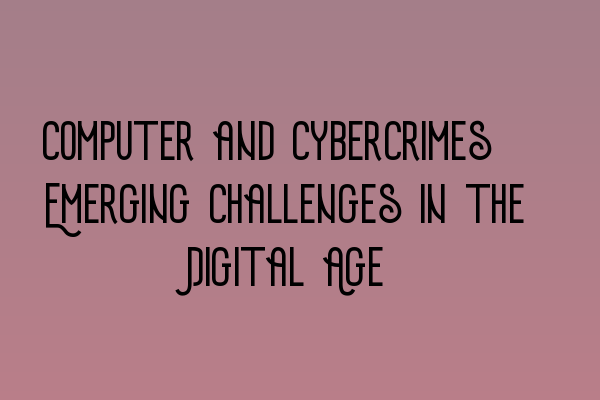Computer and Cybercrimes: Emerging Challenges in the Digital Age
The digital age has revolutionized the way we live, work, and communicate. With the increasing reliance on computers and the internet, a new breed of criminals has emerged – cybercriminals. These criminals exploit vulnerabilities in our interconnected world, posing significant challenges for law enforcement and legal professionals in tackling computer and cybercrimes.
In this blog post, we will explore the emerging challenges in the digital age and highlight the importance of staying ahead of the curve in combating computer and cybercrimes. We will also discuss the role of legal professionals in addressing these challenges effectively.
Understanding Computer and Cybercrimes
Computer and cybercrimes encompass a wide range of illegal activities that are facilitated by computers and the internet. These crimes can include but are not limited to hacking, identity theft, data breaches, malware attacks, phishing scams, and online fraud. The sophistication of these crimes continues to evolve, making it crucial for legal professionals to stay updated with the latest developments and techniques employed by cybercriminals.
The Impact of Computer and Cybercrimes
The impact of computer and cybercrimes is far-reaching and affects individuals, businesses, and governments. These crimes can result in financial losses, reputational damage, loss of sensitive information, and even potential threats to national security. As society becomes more reliant on technology, the risks associated with computer and cybercrimes increase exponentially.
The Challenges Faced by Legal Professionals
Legal professionals, including solicitors specializing in criminal law, are confronted with unique challenges when it comes to investigating, prosecuting, and defending computer and cybercrimes. These challenges include:
1. Rapidly Evolving Technology: Cybercriminals are quick to adapt to technological advancements. Legal professionals must constantly update their knowledge and skills to keep pace with emerging cyber threats.
2. Jurisdictional Issues: Cybercrimes are often transnational, making it difficult to identify and apprehend perpetrators. Legal professionals must navigate complex jurisdictional issues and international cooperation mechanisms to bring cybercriminals to justice.
3. Digital Forensics: Gathering and preserving digital evidence requires specialized knowledge in digital forensics. Legal professionals must understand the intricacies of handling digital evidence to build strong cases in court.
4. Privacy Concerns: Balancing the need to investigate and prevent cybercrimes with individual privacy rights is a delicate task. Legal professionals must navigate privacy laws and regulations to ensure they comply with legal and ethical standards.
SQE 1 Practice Mocks FLK1 FLK2
The Role of Legal Professionals
Legal professionals play a critical role in combatting computer and cybercrimes. They are the first line of defense in identifying and reporting potential cybercrimes, as well as providing legal advice and representation to victims and defendants. Some key responsibilities of legal professionals in the digital age include:
1. Prevention: Through educating clients and the general public about the risks and consequences of cybercrimes, legal professionals can help prevent these crimes from occurring in the first place.
2. Investigation: Legal professionals work closely with law enforcement agencies to investigate computer and cybercrimes. They leverage their knowledge of digital forensics and cyber laws to collect, analyze, and present evidence in court.
3. Prosecution: Legal professionals play a crucial role in prosecuting cybercriminals. They work closely with prosecuting authorities to build strong cases, present evidence, and advocate for appropriate penalties.
4. Defense: Legal professionals also provide legal representation and defense to individuals accused of computer and cybercrimes. They ensure their clients’ rights are protected throughout the legal process.
Staying Ahead of the Curve
To effectively address the challenges posed by computer and cybercrimes, legal professionals must constantly update their knowledge and skills. This includes staying informed about the latest cyber threats, understanding evolving technologies, and familiarizing themselves with relevant laws and regulations.
Continuing professional development (CPD) programs, specialized training courses, and certifications can help legal professionals stay ahead of the curve. These resources provide valuable insights into tackling computer and cybercrimes, equipping legal professionals with the knowledge and tools necessary to navigate this complex and ever-changing field.
The Future of Combating Computer and Cybercrimes
As technology continues to advance, so will the techniques employed by cybercriminals. It is essential for legal professionals, law enforcement agencies, and policy-makers to work collaboratively to combat computer and cybercrimes effectively. This includes promoting international cooperation, supporting research and development in cybersecurity, and enacting legislation that keeps pace with emerging cyber threats.
Legal professionals have a vital role to play in safeguarding society against computer and cybercrimes. By staying proactive, continuously learning, and employing innovative strategies, legal professionals can make a significant impact in this digital age.
Remember, if you need assistance with criminal law matters or advice regarding computer and cybercrimes, our team of expert solicitors at SQE Criminal Law & Practice Law UK is here to assist you.
